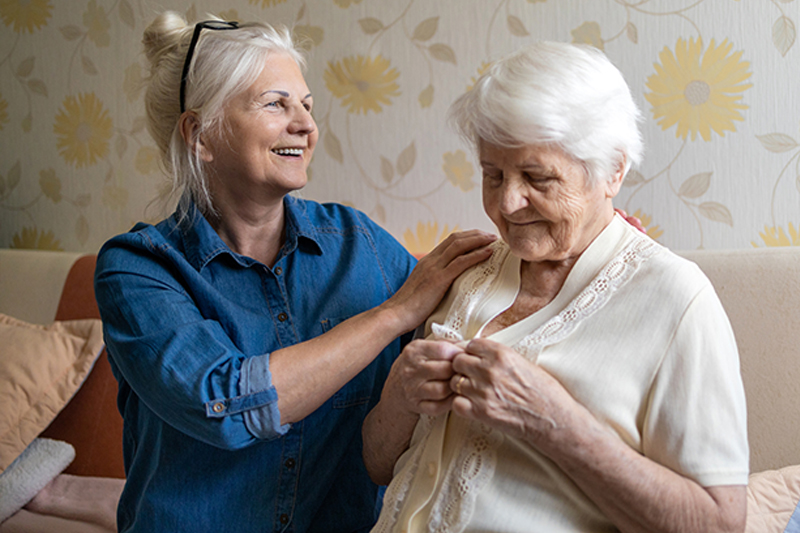
Learn about the changes in behavior in middle stage dementia.
Receiving the news that a senior loved one has been diagnosed with dementia is life-altering. Thinking through the many different factors and facets of the disease as well as its effects, both currently as well as in the future, can be overwhelming.
In this three-part series, we examine the early, middle and later stages of dementia. Learn about the type of care necessary during each stage, what family caregivers should expect, and how Anthem Home Care, the experts in caring for dementia in Portland and surrounding areas, can help.
Middle Stage Dementia Caregiving
The transition from early stage to middle stage dementia takes place gradually, and may even be unnoticeable at first. Gradually, a senior in this stage will start to encounter advancing challenges with daily tasks, such as getting dressed. It is very important for family caregivers to continue to encourage a sense of autonomy, allowing the senior loved one to complete these tasks at his / her own pace for as long as possible (and as long as it is safe to do so). This involves patience, flexibility, and adaptability.
It will become necessary to devote more time to providing care, and to formulate creative strategies and approaches to reduce frustration – for the senior and for yourself. Self-care becomes vitally important in the middle stage of dementia to help caregivers manage stress.
Here is what you might expect to encounter in this stage:
Behavioral Changes
- Anxiety
- Irritability
- Depression
- Repetitive behaviors
- Aggressive outbursts (verbal and/or physical)
Ways to Help
Keeping up a relaxed demeanor is crucial. Never argue or try to reason with a person in the middle stage of dementia. In a calm and soothing tone, recognize the feeling behind the behavior and offer recommendations that can help. For example: “Mom, I can see you are feeling annoyed about misplacing your favorite blouse. It is most likely in the washing machine. This violet one looks pretty on you; do you want to wear it today?”
Recognize that the words and actions being expressed are not a reflection of you personally, but simply part of the normal development of dementia. Often, there is an underlying emotion, such as fear, exhaustion, or hunger, driving the behavior. Attempt to identify the main cause and address that.
Communication Changes
- Losing train of thought
- Forgetting a word
- Repeating statements or questions
- Using more non-verbal communication
Ways to Help
Accept whatever kind of communication is most effective for the individual, without trying to correct her or him. Alter your communication technique to make it easier for the older adult to understand and respond to you. As an example, as opposed to asking open-ended questions (“What would you like for lunch today?”) offer a choice between just two choices (“Would you like tuna or chicken for lunch today?”). Speak in a clear, soothing tone, and allow your loved one ample time to respond without jumping in and providing the answer yourself.
Safety-Related Changes
- Wandering
- Driving concerns
- Sundowning
In this stage of the disease, paying closer focus on safety issues becomes critical. Driving should cease – something that’s oftentimes hard for seniors to accept. When possible, include the senior loved one in making this decision. If not, a note from the physician prohibiting driving is generally the most effective way to gain his/her consent. In the event the older adult is insistent about continuing to drive, you may have to take away the keys, or replace his/her set of keys with nonworking ones.
Additionally, wandering and sundowning become alarming and hard for family caregivers to manage independently. Partnering with a reliable care provider with experience in dementia care, like Anthem Home Care, is a perfect solution. Our licensed experts provide care for dementia in Portland and nearby areas that can take the night shift, ensuring seniors are safe and distracted with enjoyable activities when struggling to sleep – enabling family caregivers to get the rest they need.
For more information on our specialized in-home dementia care, reach out to us any time at 361-643-2323. To see all of the communities where we provide care, please visit our Service Area page.
